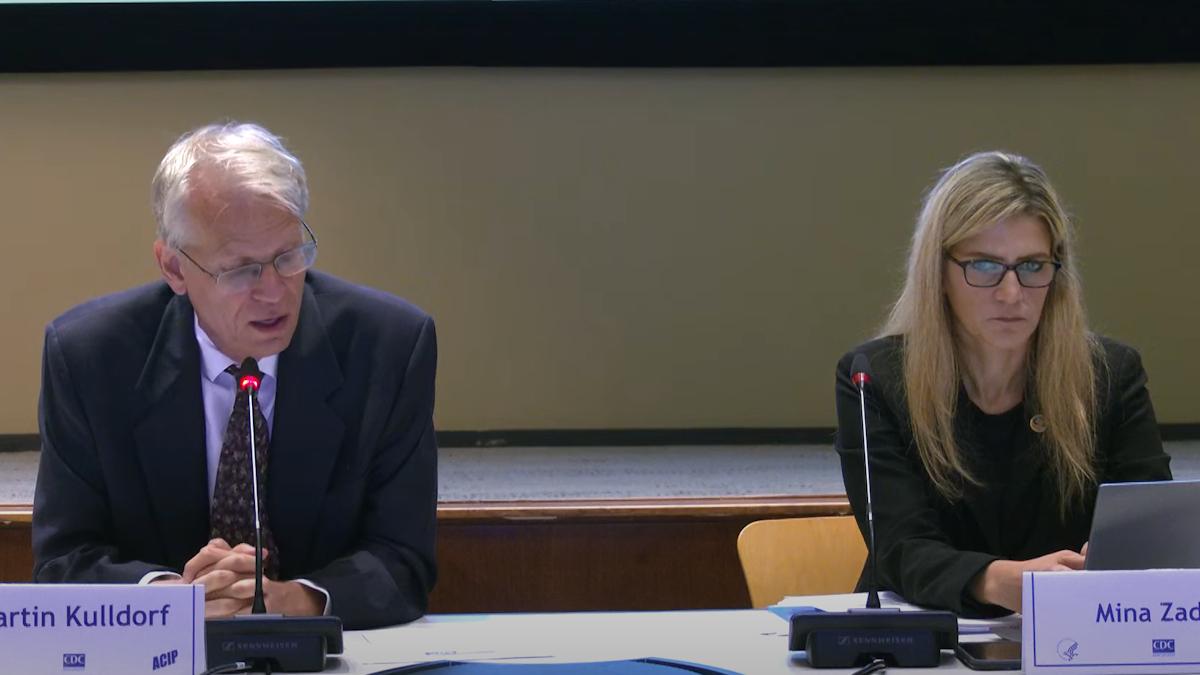ACIP backs block on flu vaccines with thimerosal additive

ACIP chair Martin Kulldorff and executive secretary Minah Zadeh.
The CDC's newly constituted Advisory Committee on Immunization Practices (ACIP) has voted to recommend the removal of vaccine preservative, thimerosal, that has become a focal point for activists trying to link vaccines to autism.
The panellists voted in favour of advising that children, pregnant women, and adults only get single-dose seasonal influenza vaccines that are thimerosal-free, despite more than 20 years of research that has backed its safety. Moreover, thimerosal was removed from all routine childhood vaccines in the US years ago, although, it remains in some multidose flu vaccine products and is still widely found in vaccines used in other countries.
The votes took place after a presentation by Lyn Redwood – a recent appointment to the Department of Health and Human Services (HHS) by Secretary Robert F Kennedy Jr – who is a retired nurse and former president of Children's Health Defense, an anti-vaccine group founded by Kennedy that has claimed that there is a link between thimerosal and autism.
It has emerged that one study cited in an earlier version of Redwood's presentation was fictitious and, during public questions to the panel, there were multiple requests for a more balanced, peer-reviewed presentation from CDC on thimerosal, by acknowledged experts in the field, before a vote should be taken.
One of them – president of the American College of Pediatrics, Jason Goldman, asked: "Will there be an actual CDC presentation done by staff, scientists, physicians, and [...] subject matter experts with accurate peer-reviewed scientific data [...] or will we have layperson presentations only?"
ACIP chair Martin Kulldorff retorted that it would be "inappropriate to dismiss a presentation just because the person does not have a PhD or MD."
ACIP member and paediatrician Cody Meissner, the one voice on the panel to argue in favour of thimerosal and who voted against all the thimerosal recommendations, said: "I'm not quite sure how to respond to this presentation – this is an old issue that has been addressed in the past."
He reiterated that all vaccines that are recommended for use in children under six in the US are available in formulations that do not include thimerosal as a preservative.
"Of all the issues the ACIP needs to focus on, this is not a big issue. The risk from influenza is so much greater than the non-existent, as far as we know, risk from thimerosal. I would hate for a person not to receive the influenza vaccine because the only available preparation contains thimerosal – I find that very hard to justify."
During the session on flu vaccines, the ACIP also voted to continue recommending routine annual flu shots for anyone older than six months who would otherwise be at risk from the virus.
The new panellists – reduced from eight down to seven as one (Michael Ross) withdrew during a financial holdings review – are meeting for the first time since Kennedy fired all 17 former members earlier this month. Thimerosal was not on the original agenda for the meeting, but was added after Kennedy reconstituted the panel.
Possible consequences of a ban on the preservative include that many countries around the world have traditionally followed the advice of the panel, and removing it from formulations could be challenging, particularly in lower-income countries where multidose presentations are more common, and create access issues.
Shortly after the votes, an open letter to the White House, Kennedy, and Congress from the Partnership to Fight Infectious Disease, signed by dozens of infectious disease specialists, called once again for the reinstatement of the original ACIP membership.
Kennedy's unilateral appointment of new panellists without due process "will further undermine the increasingly fragile trust Americans have in vaccine recommendations, threatening decades of progress against vaccine-preventable illnesses," they assert.
"This moment requires a commitment to facts over fear, expertise over ideology, and your constituents' health over politics. The American people deserve no less."












